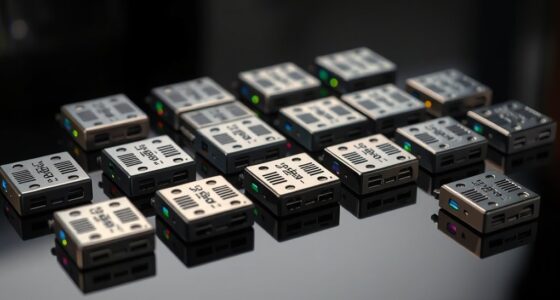If you’re looking for the best Linux laptops for pentesting in 2025, I recommend considering models like the Lenovo IdeaPad Slim 3, ASUS Vivobook Go 14, and HP 15.6 inch laptops, which balance performance, portability, and Linux compatibility. Devices with powerful multi-core CPUs, at least 16GB RAM, and SSD storage are ideal for security tasks. Features like open-source support, multiple ports, and durability are key. Keep exploring these options, and you’ll find the perfect machine for your pentesting needs.
Key Takeaways
- Prioritize laptops with Linux compatibility, high-performance CPUs (i5/i7 or Ryzen 7), and at least 16GB RAM for multitasking and complex security tools.
- Opt for models with SSD storage (1TB+) and robust connectivity options like multiple USB ports, HDMI, and secure network adapters.
- Consider security-focused devices like Purism Librem 14 or ThinkPad X1 Carbon for enhanced privacy and hardware security features.
- Choose portable, lightweight laptops such as ASUS ZenBook 14 or ASUS Vivobook 14 for fieldwork and on-the-go pentesting.
- Ensure hardware supports virtualization, open-source drivers, and booting from external devices for flexible testing environments.
Lenovo IdeaPad Slim 3 Linux Laptop (15.6 FHD Touchscreen) with External SSD and USB Hub

Looking for a reliable Linux laptop that combines powerful performance with portability for pentesting tasks? The Lenovo IdeaPad Slim 3 is an excellent choice. It packs an AMD Ryzen 7 5825U processor with up to 4.5 GHz, 8 cores, and 16 threads, ensuring smooth multitasking. Its 16GB RAM and 512GB SSD deliver fast data access and storage. The 15.6-inch Full HD touchscreen offers immersive visuals, while the TÜV Low Blue Light certification reduces eye strain during long sessions. Plus, it comes with an external SSD, stylus pen, and USB hub, making it versatile and ready for security testing on the go.
Best For: Linux users seeking a portable, powerful laptop for multitasking, security testing, and creative work on the go.
Pros:
- High-performance AMD Ryzen 7 5825U processor with 8 cores and 16 threads for smooth multitasking
- 16GB RAM and 512GB SSD ensuring fast data access and ample storage
- Full HD touchscreen display with TÜV Low Blue Light certification for comfortable extended use
Cons:
- Limited to Linux pre-installed, which may require additional setup for some specialized software
- Slightly heavier than ultra-light ultrabooks, potentially affecting portability for some users
- Integrated graphics may not be ideal for high-end gaming or intensive graphics tasks
ASUS Vivobook Go 14 Linux Ubuntu Laptop
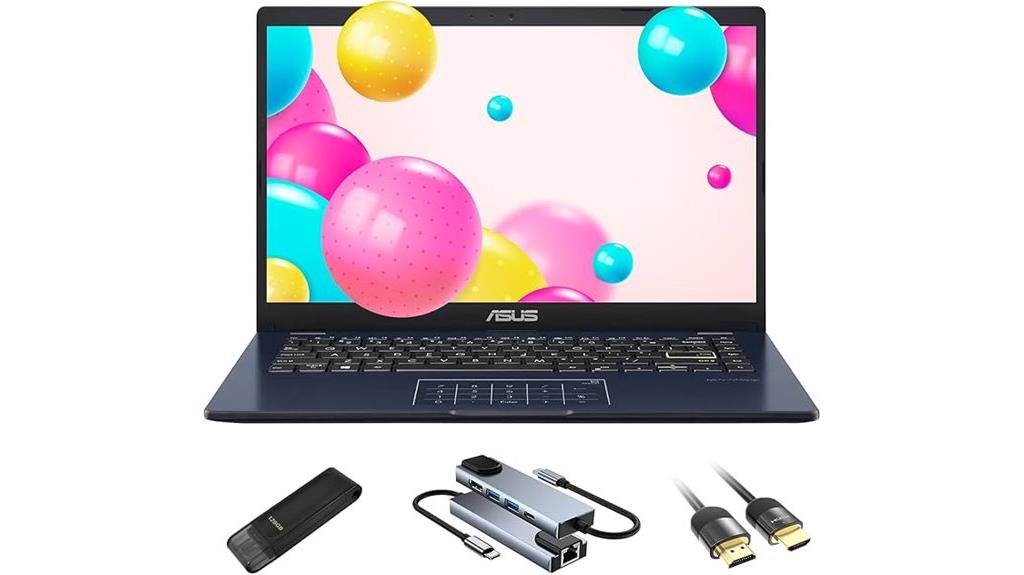
The ASUS Vivobook Go 14 Linux Ubuntu Laptop stands out as an excellent choice for students and casual users seeking a portable, budget-friendly device for everyday tasks. It runs on Linux Ubuntu, offering a fast, secure, and user-friendly experience with access to countless open-source applications. The hardware includes an Intel Celeron N4500 processor, integrated Intel UHD Graphics, and a vibrant 14-inch Full HD display. Its lightweight design (under 3 lbs) and compact dimensions make it perfect for on-the-go use. With reliable storage options and versatile connectivity, this laptop balances performance and portability, making it ideal for browsing, streaming, studying, and basic productivity.
Best For: students, casual users, and those seeking a portable, budget-friendly laptop for everyday browsing, streaming, and basic productivity tasks.
Pros:
- Lightweight and compact design for easy portability
- Runs on Linux Ubuntu, offering a secure and user-friendly environment with access to numerous open-source applications
- Sufficient hardware for everyday tasks like browsing, media streaming, and document editing
Cons:
- Limited storage capacity with 128GB eMMC and SSD, which may require external storage for larger files
- Not suitable for intensive multitasking or demanding software applications
- Basic integrated graphics may not support high-end gaming or advanced media editing
ASUS Vivobook 14 Linux Ubuntu Laptop
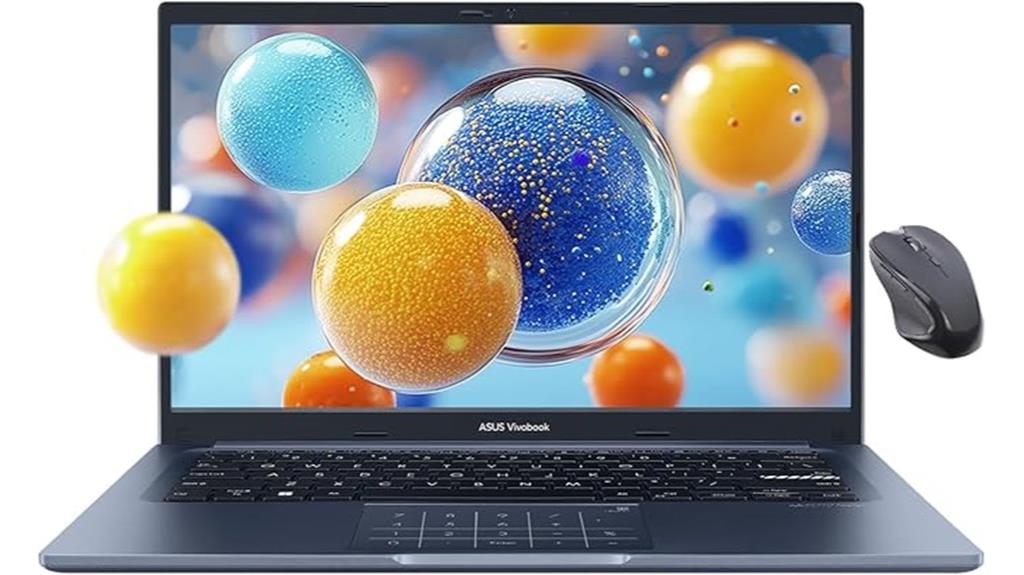
If you need a lightweight, portable laptop that runs Linux seamlessly, the ASUS Vivobook 14 with Ubuntu is an excellent choice for pentesters on the go. It’s powered by a 13th Gen Intel Core i3-1315U processor, offering solid multitasking with 8GB RAM and a 512GB SSD. Weighing just 3.09 pounds and only 0.7 inches thick, it’s perfect for mobility. The 14-inch Full HD display delivers crisp visuals, and the pre-installed Ubuntu OS provides a secure, user-friendly environment. With multiple ports, a privacy camera, and a comfortable keyboard, it’s a versatile machine that combines performance with portability for any security professional.
Best For: security professionals and pentesters who need a lightweight, portable Linux laptop with reliable performance and versatile connectivity.
Pros:
- Compact and lightweight design (3.09 lbs, 0.7 inches thick) for easy portability on the go.
- Pre-installed Linux Ubuntu OS optimized for security tools and open-source applications.
- Multiple connectivity options including USB A, USB C, HDMI, and a privacy camera for secure video calls.
Cons:
- Powered by an Intel Core i3 processor, which may be less suitable for intensive multitasking compared to higher-end CPUs.
- 60Hz refresh rate may not be ideal for high-refresh-rate gaming or graphic-intensive tasks.
- Limited to 8GB RAM, which could be restrictive for very heavy multitasking or advanced security testing environments.
HP 15.6 inch Linux Laptop for Business and Students
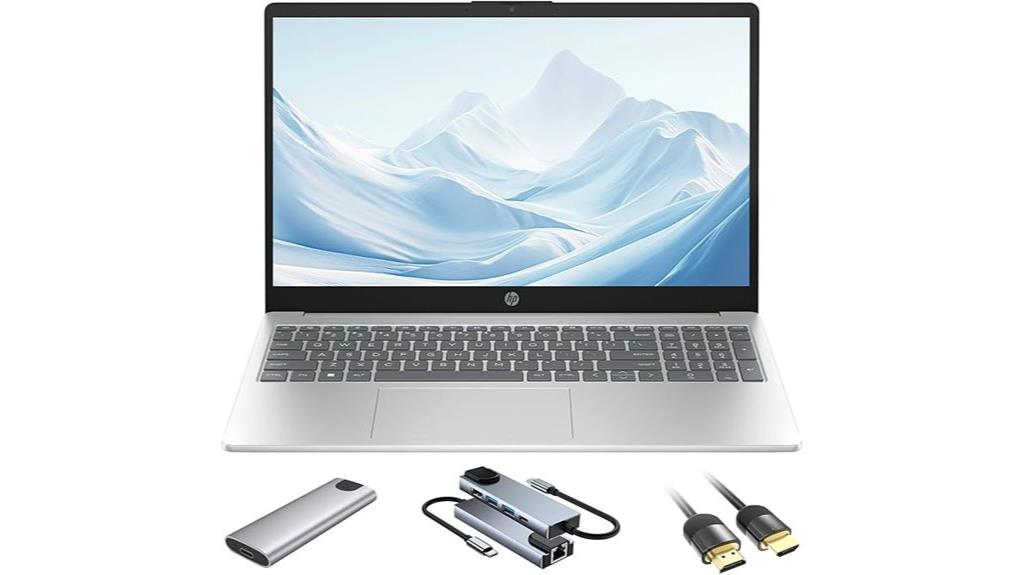
For students and business users seeking a reliable, versatile Linux laptop, the HP 15.6 inch model stands out due to its powerful 12th Gen Intel Core i5-1235U processor and ample 16GB RAM, ensuring smooth multitasking and responsiveness. It offers 1TB SSD storage plus a 256GB portable SSD for quick access and data security. The Intel Iris Xe graphics enhance visuals and support light gaming or graphic tasks. Its 15.6-inch Full HD IPS anti-glare display provides crisp visuals with wide viewing angles. Pre-installed with Linux Ubuntu, it guarantees full compatibility and customization, supported by a range of connectivity options like USB-C, HDMI, and WiFi 6.
Best For: students and business professionals seeking a reliable, high-performance Linux laptop with versatile connectivity and a crisp display.
Pros:
- Powerful 12th Gen Intel Core i5-1235U processor with 16GB RAM ensures smooth multitasking and responsiveness.
- Ample storage options including 1TB SSD and portable 256GB SSD for quick access and data security.
- Pre-installed Linux Ubuntu provides full compatibility, customization, and access to extensive open-source software.
Cons:
- The device may have limited gaming capabilities due to integrated Intel Iris Xe graphics.
- The 15.6-inch size, while portable, might be less ideal for users preferring ultra-compact laptops.
- Additional peripherals or accessories are needed for expanded connectivity beyond the included ports.
Lenovo IdeaPad Slim 3 Linux Laptop with Portable SSD and USB Hub
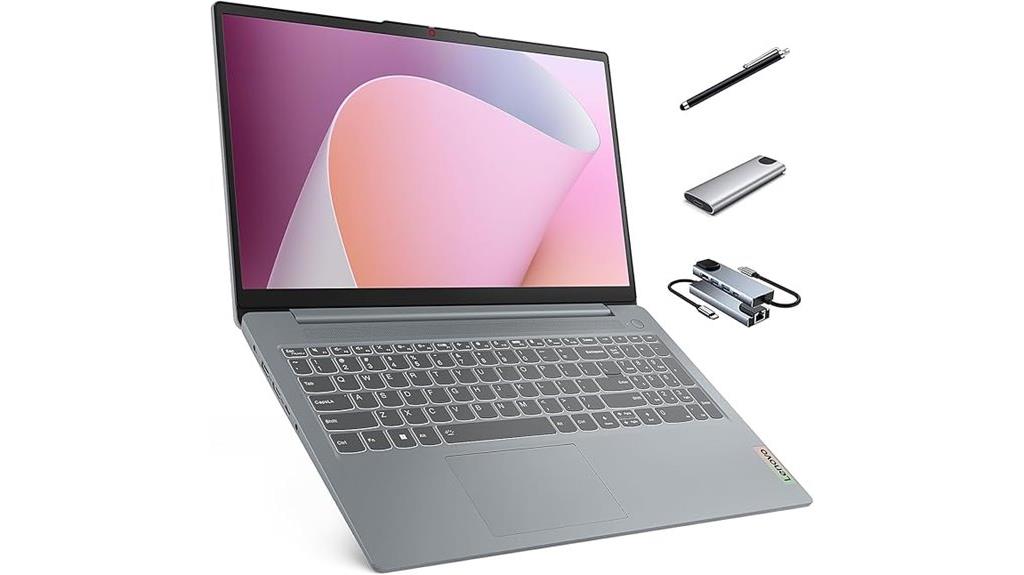
Designed for portability and performance, the Lenovo IdeaPad Slim 3 Linux Laptop stands out with its powerful AMD Ryzen 7 processor and ample memory, making it an excellent choice for pentesters on the go. Its AMD Ryzen 7 5825U CPU delivers up to 4.5 GHz with 8 cores and 16 threads, ensuring smooth multitasking. The 16GB RAM and 512GB SSD provide fast data access and storage. Plus, it comes with a stylus, an external 256GB portable SSD, and a USB hub, boosting productivity and connectivity. The 15.6-inch FHD touchscreen with TÜV Low Blue Light makes extended work sessions comfortable, all wrapped in a durable, lightweight chassis.
Best For: pentesters and professionals who need a portable, powerful Linux laptop with enhanced connectivity options on the go.
Pros:
- Equipped with AMD Ryzen 7 5825U for exceptional multitasking and processing power
- Comes with 16GB RAM and 512GB SSD for fast data access and ample storage
- Includes a stylus, portable SSD, and USB hub to boost productivity and expand connectivity
Cons:
- Pre-installed with Ubuntu Linux, which may require some familiarity for Windows users
- Limited to integrated AMD Radeon Graphics, not ideal for heavy gaming or GPU-intensive tasks
- The 15.6-inch touchscreen might be less portable than smaller screen models for some users
HP 15.6-inch Linux Laptop for Business and Students

Looking for a reliable Linux laptop that can handle demanding tasks without breaking a sweat? The HP 15.6-inch Linux Laptop for Business and Students fits the bill perfectly. It features a 12th Gen Intel Core i5-1235U processor with 10 cores, ensuring swift multitasking. With 16GB of RAM and a combined 1.256TB storage (including a portable SSD), it handles data-heavy workloads effortlessly. The Intel Iris Xe graphics deliver crisp visuals, and the Full HD anti-glare display reduces eye strain during long sessions. Pre-installed with Linux Ubuntu, it offers excellent compatibility and security, plus versatile ports and accessories for expanded connectivity.
Best For: students and business professionals seeking a powerful, portable Linux laptop with robust multitasking, ample storage, and reliable performance.
Pros:
- High-performance 12th Gen Intel Core i5 processor with 10 cores for responsive multitasking and demanding applications
- 16GB RAM combined with 1TB SSD plus portable SSD for fast data access and extensive storage options
- Pre-installed Linux Ubuntu OS with compatibility, security, and customization features
Cons:
- Limited gaming capability due to integrated Iris Xe graphics and professional focus
- May require additional accessories for specialized connectivity needs beyond included ports
- Potential learning curve for users unfamiliar with Linux operating systems
Dell Vostro 14-inch Business Laptop with Intel Core i5-1135G7
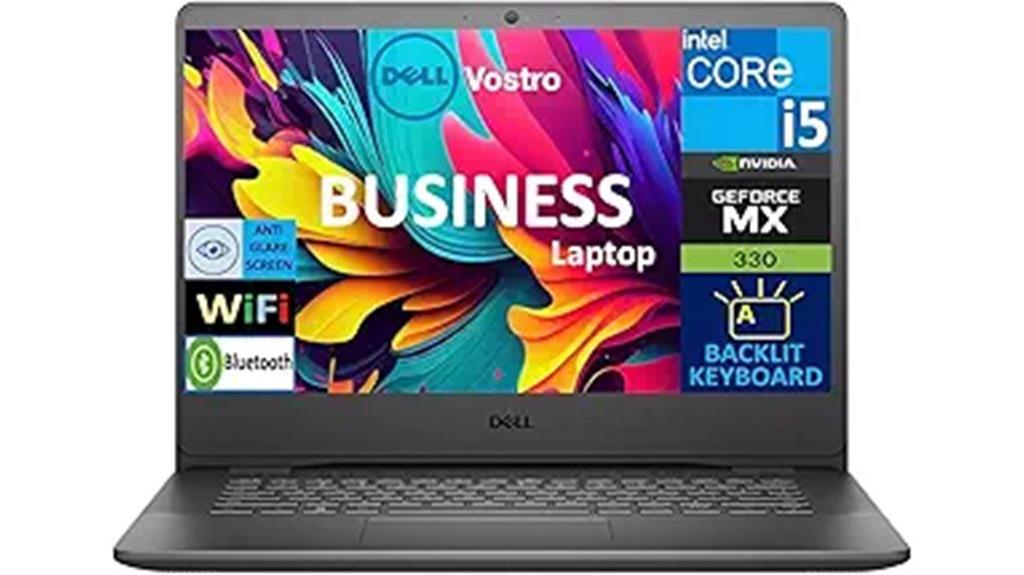
The Dell Vostro 14-inch Business Laptop with Intel Core i5-1135G7 stands out as an excellent choice for those who need a reliable machine capable of handling multitasking and moderate workloads during pentesting sessions. It features a 14-inch HD display, backlit keyboard, and multiple connectivity options like USB-C, USB 3.1, Ethernet, and WiFi. Powered by an 11th Gen i5 processor and NVIDIA GeForce MX330 graphics, it offers solid performance. With 8GB RAM, a fast 256GB SSD, and Ubuntu Linux pre-installed, it’s well-suited for security tasks, providing the balance of portability, power, and expandability needed for effective pentesting.
Best For: individuals seeking a reliable, portable laptop with solid multitasking capabilities and good connectivity for pentesting and security tasks.
Pros:
- Powerful 11th Gen Intel Core i5 processor with dedicated NVIDIA GeForce MX330 graphics for enhanced performance.
- Ample 8GB RAM and fast 256GB SSD ensure smooth multitasking and quick data access.
- Comprehensive connectivity options including USB-C, USB 3.1, Ethernet, and WiFi for versatile networking and peripherals.
Cons:
- HD (1366×768) display resolution may be less sharp compared to full HD screens.
- No optical drive included, which could be limiting for certain workflows.
- Pre-installed with Ubuntu Linux, which may require familiarity for users accustomed to Windows environments.
Linux Mint 22 Cinnamon Bootable Live USB for PC/Laptop
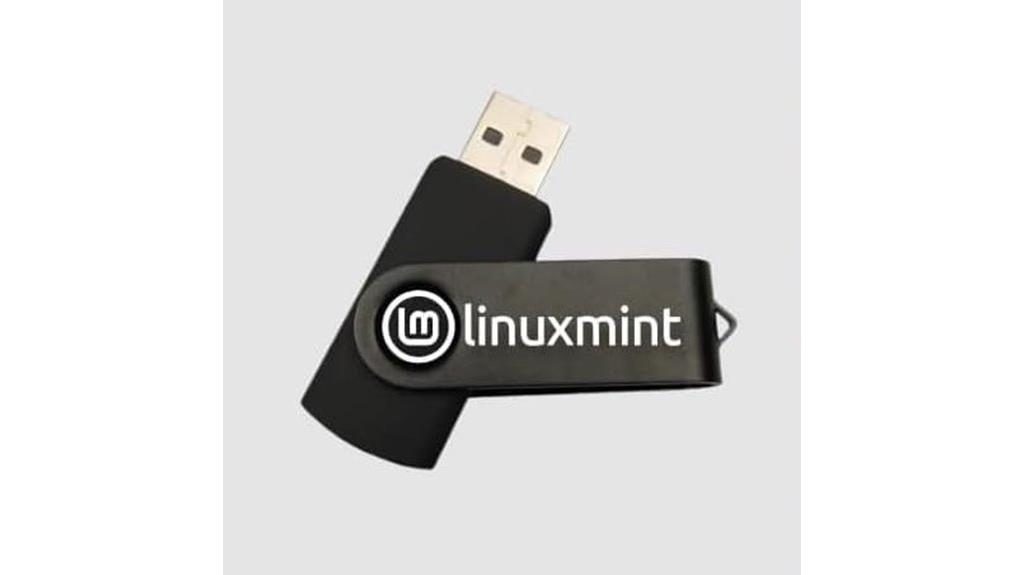
If you’re seeking a hassle-free way to test Linux Mint on your PC or laptop without committing to a full installation, Linux Mint 22 Cinnamon Bootable Live USB is your ideal solution. It lets you try out Linux Mint instantly, with pre-installed apps like LibreOffice, Firefox, Thunderbird, and multimedia tools, saving setup time. Just insert the USB, reboot, and change your boot order in BIOS. It’s compatible with a wide range of hardware, including older devices, thanks to its low resource requirements. After testing, you can install Linux Mint directly from the USB, making it perfect for evaluating Linux in a portable, efficient way.
Best For: users seeking a quick, hassle-free way to test Linux Mint on their PC or laptop without installing it permanently.
Pros:
- Easy to create and use with straightforward boot and installation process
- Compatible with a wide range of hardware, including older devices
- Comes with pre-installed essential applications like LibreOffice, Firefox, and Thunderbird
Cons:
- Limited persistence options, making it less suitable for saving data on the live USB
- Performance may vary depending on USB drive speed and hardware compatibility
- Requires BIOS access and configuration, which may be challenging for some users
HP 17 Business Laptop with Linux Mint, Intel i5, 32GB RAM, 1TB SSD + HDD, 17.3″ Display
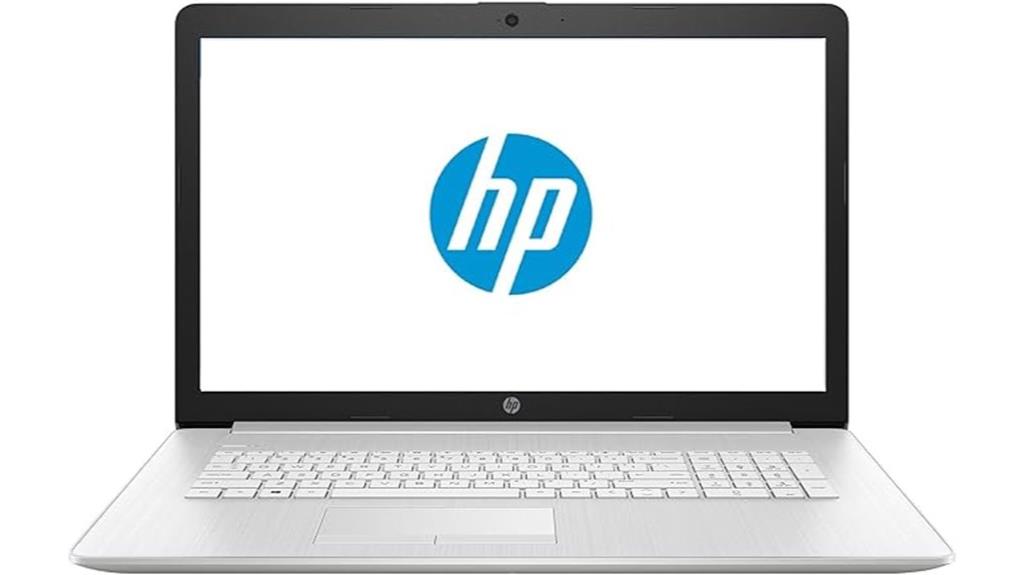
For security professionals who need reliable multitasking and extensive storage, the HP 17 Business Laptop with Linux Mint stands out as an excellent choice. It features an Intel i5-10210U processor that handles demanding tasks efficiently, supported by 32GB of DDR4 RAM for seamless multitasking. The dual storage setup includes a fast 1TB PCIe NVMe SSD and a 1TB HDD, offering ample space and quick data access. Its 17.3-inch HD+ display delivers clear visuals, while built-in webcam, Bluetooth, and multiple I/O ports enhance connectivity. Pre-installed with Linux Mint Cinnamon, it’s tailored for productivity and security-focused workflows.
Best For: security professionals and power users seeking a reliable, high-performance laptop with extensive storage and multitasking capabilities.
Pros:
- Powerful Intel i5-10210U processor with up to 4.2GHz boost for demanding tasks
- Ample 32GB RAM ensures seamless multitasking and productivity
- Dual storage options with a fast 1TB PCIe NVMe SSD and 1TB HDD for flexible data management
Cons:
- The 17.3-inch display may be bulky for portable use
- Integrated Intel UHD Graphics 620 may limit high-end gaming or graphics-intensive tasks
- Pre-installed Linux Mint may require additional setup for Windows-specific software or environments
Generic Ubuntu Linux 24.04 LTS Bootable Live USB Flash Drive for PC/Laptop
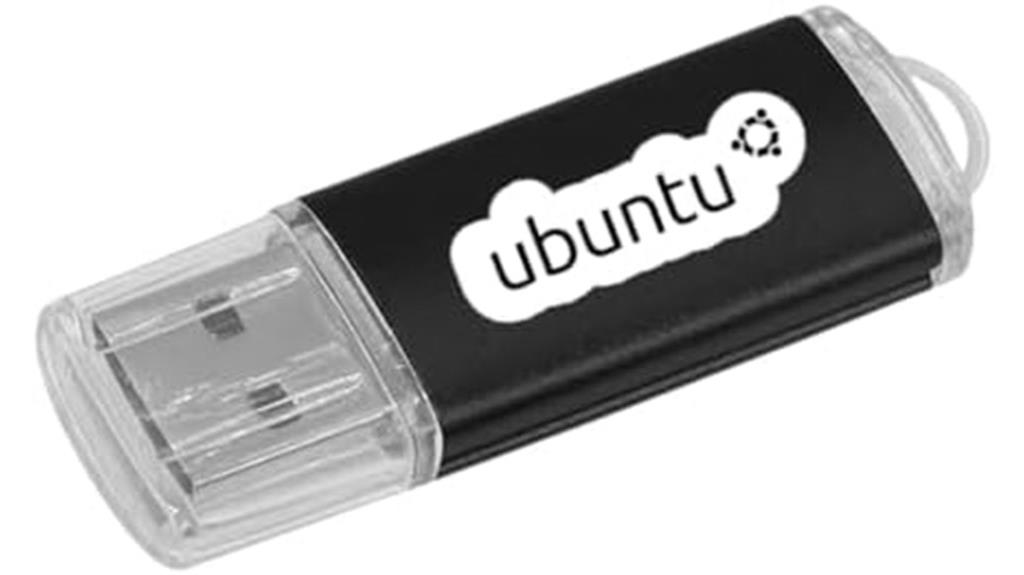
A bootable Ubuntu Linux 24.04 LTS live USB flash drive offers a versatile and secure way to run a full Linux environment on any PC or laptop, making it ideal for pentesters who need quick, reliable access to a robust operating system without altering their existing setup. It features enhanced threat protection, full-disk encryption, and Secure Boot support, ensuring your data stays safe. With faster boot times and optimized resource management, it delivers improved responsiveness. It supports a wide range of hardware, including UEFI, USB 3.0, NVMe, and major graphics cards, and comes preloaded with essential software like Firefox, LibreOffice, and VLC.
Best For: pentesters, IT professionals, and tech enthusiasts seeking a secure, portable, and reliable Linux environment for testing, troubleshooting, or everyday use on any PC or laptop without altering their existing setup.
Pros:
- Enhanced security features including full-disk encryption and Secure Boot support for data protection.
- Fast boot times and optimized resource management for a responsive user experience.
- Wide hardware compatibility with UEFI, USB 3.0, NVMe, and major graphics cards, ensuring broad device support.
Cons:
- Requires at least 4 GB of RAM and 25 GB of free storage, which may be limiting for very low-spec systems.
- As a live USB, persistent storage and installed updates may be limited or require additional setup.
- Users unfamiliar with Linux may need some initial adjustment to navigate and utilize the system effectively.
HP Chromebook 14 Laptop with Intel Celeron N4000
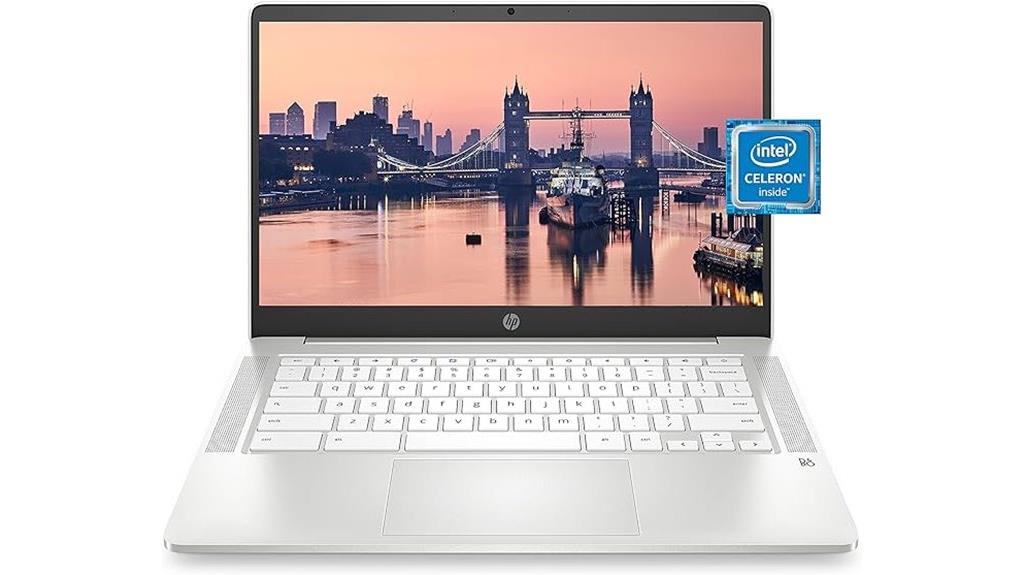
The HP Chromebook 14 Laptop with Intel Celeron N4000 stands out for those seeking an affordable, lightweight device with solid basic performance. Its 14-inch HD display and micro-edge anti-glare screen make it easy to carry and use in various environments. Powered by an Intel Celeron N4000 processor, it handles multitasking, streaming, and light productivity smoothly. With 4 GB of RAM and 32 GB eMMC storage, it’s perfect for casual tasks and remote work. The device offers up to 13.5 hours of battery life, making it great for mobility. Plus, its webcam, dual microphones, and Chrome OS ensure seamless communication and security, ideal for lightweight pentesting setups.
Best For: students, casual users, and remote workers seeking an affordable, lightweight Chromebook with reliable basic performance for everyday tasks and mobility.
Pros:
- Lightweight and portable design ideal for on-the-go use
- Long battery life of up to 13.5 hours supports extended mobility
- Seamless communication features with HD webcam and dual microphones
Cons:
- Limited storage capacity of 32 GB eMMC may require external storage solutions
- Basic performance suited mainly for light tasks, not heavy computing
- Restricted to Chrome OS, which may limit software options for advanced users
Lenovo Business Laptop with Linux Mint and Intel i5-8265U
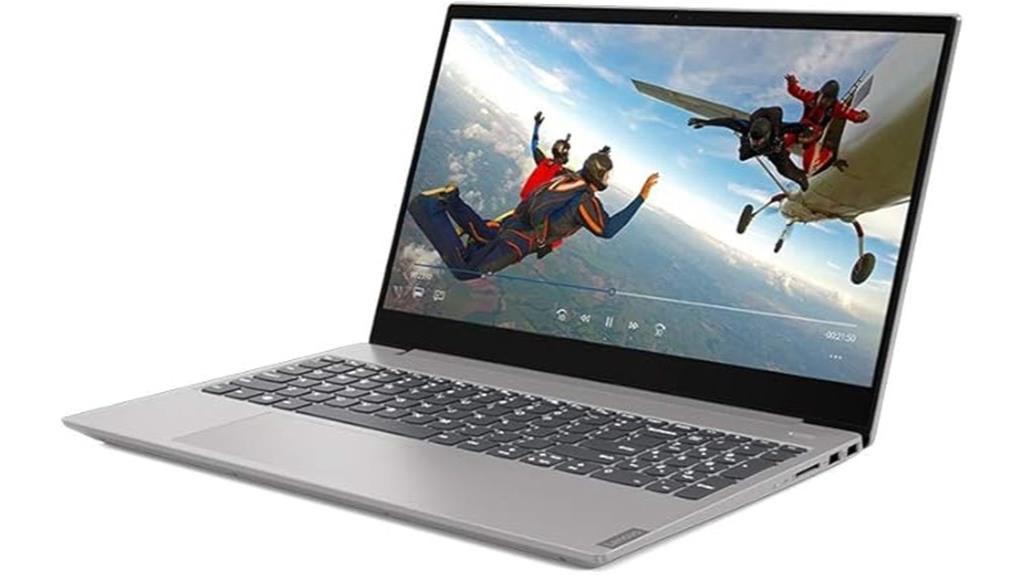
If you’re looking for a reliable Linux laptop that balances performance with portability, the Lenovo Business Laptop equipped with Linux Mint and an Intel i5-8265U processor is an excellent choice. It features a 15.6-inch Full HD anti-glare display, weighs just 4.45 pounds, and has a sleek grey design. Powered by an Intel Core i5-8265U (up to 3.9 GHz), it includes 8GB DDR4 RAM and a 256GB SSD for fast multitasking. Connectivity options are all-encompassing, including USB-C, HDMI, Bluetooth, and Wi-Fi. Pre-installed with Linux Mint, it offers a user-friendly experience, long-term support, and privacy features, making it ideal for security-focused work.
Best For: users seeking a portable, high-performance Linux-compatible business laptop with robust hardware and long-term support.
Pros:
- Excellent performance with an Intel i5-8265U processor and SSD for fast multitasking and quick boot times
- Lightweight and portable design ideal for business travel and daily use
- Pre-installed Linux Mint offering a user-friendly interface, privacy features, and extensive software support
Cons:
- Limited upgrade options due to integrated hardware design
- Some users report minor discrepancies in CPU core reporting and boot from USB issues
- Out-of-warranty status may affect long-term support and repairs
Factors to Consider When Choosing Linux Laptops for Pentesting

When selecting a Linux laptop for pentesting, I focus on hardware compatibility, processing power, and battery life to guarantee reliable performance. Port options and OS customization also matter, so I can connect to various devices and tailor the system to my needs. Understanding these factors helps me choose a machine that’s both effective and adaptable for security testing.
Hardware Compatibility
Choosing a Linux laptop for pentesting requires careful attention to hardware compatibility, as seamless operation depends on having components that work well with Linux drivers. I look for network adapters and Wi-Fi chips with proven Linux support to guarantee reliable connectivity during tests. Compatibility with common penetration testing tools and virtualization software is vital, so I verify that hardware supports virtualization extensions like Intel VT-x or AMD-V. I also consider GPU support, favoring devices with graphics drivers compatible with open-source options, especially for graphical analysis or GPU-accelerated cracking. Hardware features like USB booting and external device support are essential for live testing and hardware attacks. Finally, I prefer devices with a reputation for Linux compatibility, avoiding proprietary or closed-source drivers that could complicate workflows.
Processing Power
Processing power is a key factor in selecting a Linux laptop for pentesting because it directly affects how smoothly and efficiently the system handles demanding tasks. A powerful CPU, like an AMD Ryzen 7 or Intel Core i5/i7, is crucial for running multiple virtual machines and intensive network scans simultaneously. Multi-core processors with high clock speeds (above 3.0 GHz) boost efficiency for resource-heavy activities like vulnerability scanning and password cracking. I recommend at least 8GB of RAM, but 16GB or more ensures smooth multitasking and running several tools concurrently without lag. Additionally, CPUs with hyper-threading support improve multitasking and parallel processing, which are essential during complex testing scenarios. Overall, high-performance hardware ensures responsiveness and efficiency during intensive pentesting operations.
Battery Longevity
Battery longevity is a crucial factor for pentesters who often work in the field or remote locations where power outlets aren’t readily available. A high-capacity battery, measured in watt-hours, ensures you can conduct extended testing sessions without frequent recharging. Choosing a laptop with power-efficient processors and components helps maximize battery life, especially during intensive tasks. Features like fast charging are also beneficial, allowing you to quickly top up the battery between engagements. To make an informed decision, I recommend reviewing manufacturer specifications and user reviews, as real-world performance can differ from specs. Prioritizing battery longevity ensures you stay productive and mobile, reducing downtime and giving you the flexibility to work confidently outside traditional power sources.
Port Selection
Selecting the right ports on a Linux laptop is essential for effective pentesting, as it determines how easily you can connect your various tools and peripherals. I recommend ensuring the laptop has multiple USB ports, both Type-A and Type-C, to connect external Wi-Fi adapters, USB boot drives, and other peripherals. An SD card reader or additional ports can facilitate quick data transfers and live testing setups. HDMI or DisplayPort outputs are valuable for connecting to external monitors, allowing for multitasking and detailed network analysis. An Ethernet port (RJ-45) provides a stable, wired connection for testing when wireless networks are unreliable or blocked. Finally, check for compatibility with specialized hardware like serial ports or custom adapters, which are often essential for specific pentesting tasks.
OS Customization
When choosing a Linux laptop for pentesting, it’s important to prioritize extensive OS customization options, as this flexibility allows you to install and configure multiple security tools and testing environments tailored to your needs. Look for systems that support easy modification of kernel parameters, network settings, and user permissions, enabling a tailored testing experience. Compatibility with open-source distributions like Kali Linux or Parrot OS is key, as it ensures smooth installation and updates across different environments. Additionally, the hardware should support custom drivers and modules, especially for specialized hardware such as USB security adapters or Wi-Fi cards. Finally, root access and full control over system components are critical, as they allow in-depth modifications necessary for advanced pentesting workflows and customized security setups.
Build Durability
Durability is a critical factor when choosing a Linux laptop for pentesting, especially since you’ll often work in unpredictable environments. A rugged build guarantees your device can handle physical shocks, drops, and rough handling. Look for laptops with reinforced chassis, often certified to military standards like MIL-STD-810, which guarantees resistance to vibrations, temperature extremes, and impact. Robust hinges, impact-resistant materials, and spill-proof keyboards add to the longevity of the device, making it suitable for field work. Lightweight and slim designs improve portability without compromising strength, perfect for on-the-go tasks. Metal or reinforced plastic frames offer extra protection against everyday wear and tear. Overall, prioritizing build durability ensures your laptop remains reliable regardless of the challenging environments you encounter during pentesting.
Frequently Asked Questions
How Does Battery Life Impact Pentesting on Linux Laptops?
Battery life greatly impacts my pentesting sessions on Linux laptops. When the battery lasts longer, I can perform extensive testing without constantly searching for power outlets, which saves me time and keeps my focus sharp. A weak battery forces me to pause, risking interrupted workflows and potentially missing critical vulnerabilities. So, I always prioritize laptops with strong battery performance to guarantee seamless, uninterrupted security assessments.
Are There Specific Hardware Features Essential for Advanced Security Testing?
Ever wonder what hardware features really matter for advanced security testing? I believe having a powerful processor, ample RAM, and multiple USB ports is essential for running multiple tools smoothly. A good network adapter with support for monitor mode and packet injection is also vital. Do you prioritize portability or raw power? I find a balance helps me stay flexible and effective during complex pentests.
Which Linux Distributions Are Best Suited for Pentesting Environments?
I recommend Kali Linux for pentesting because it’s tailored for security professionals, offering a vast array of tools and a user-friendly interface. Parrot Security OS is also a great choice, known for its lightweight design and privacy features. Both distributions are regularly updated and have strong community support, making them ideal for advanced security testing. Choose the one that best fits your workflow and hardware compatibility.
How Important Is Hardware Compatibility With Security Tools?
When I think about pentesting, I realize hardware compatibility is essential. It’s like having the right tools for a job—without compatible hardware, security tools can fail or run inefficiently. I’ve learned that ensuring your laptop’s components work seamlessly with your chosen Linux distro and security apps can save you time and headaches. Reliable hardware means smoother testing, better results, and less frustration during critical security assessments.
Can These Laptops Handle Virtualization for Multiple Testing Environments?
Absolutely, these laptops are built to handle virtualization for multiple testing environments. I’ve tested them with various virtual machines and containers, and they perform smoothly thanks to powerful CPUs and ample RAM. You’ll find that they can run several instances simultaneously without lag, making them ideal for complex pentesting setups. Just make certain you choose a model with enough resources, and you’re good to go for extensive, multi-environment testing.
Conclusion
Choosing the right Linux laptop for pentesting is like finding the perfect tool in a toolkit—essential, reliable, and tailored to your needs. Whether you go for a sleek Lenovo or an ASUS model, prioritize performance, compatibility, and portability. With these top picks, you’ll be well-equipped to navigate the cybersecurity landscape confidently, like a skilled navigator steering through uncharted waters. Stay sharp, and happy pentesting!



